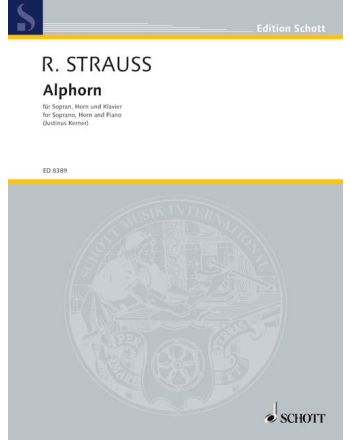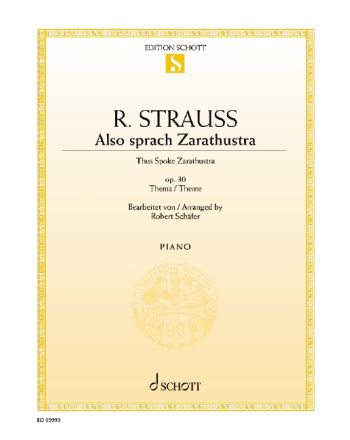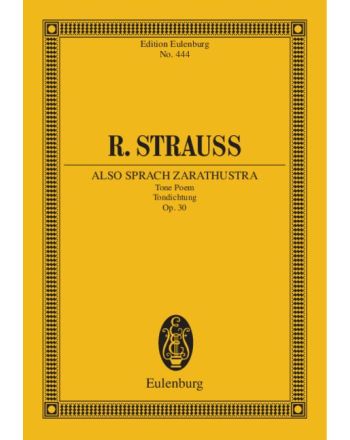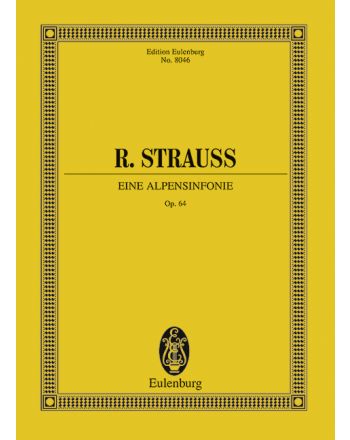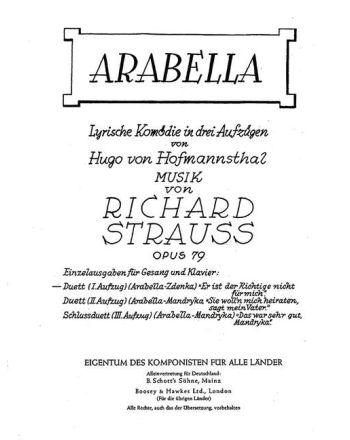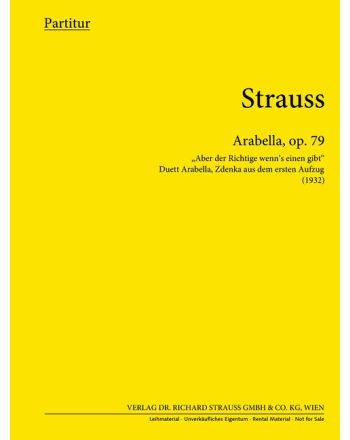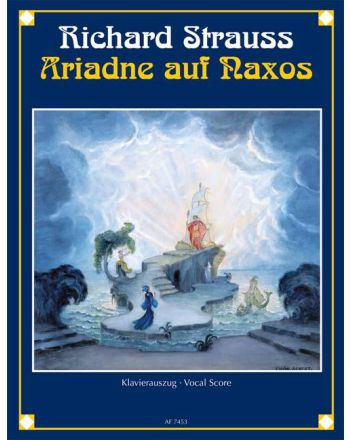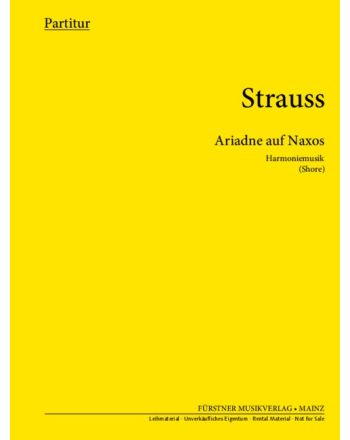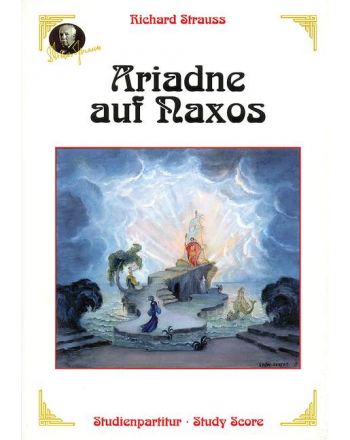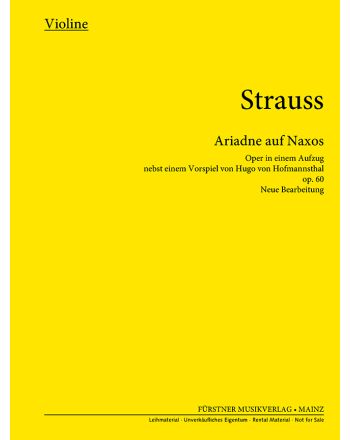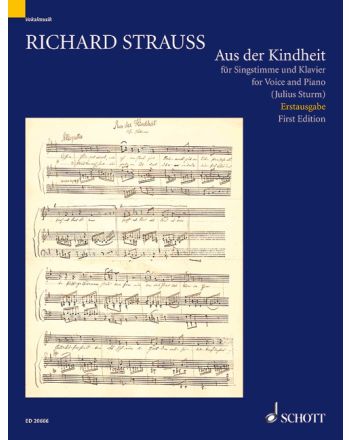
Richard Strauss
À venir
À propos de Richard Strauss
Richard Strauss was born in Munich on 11 June 1864. As son of the principal horn player at the Munich Court Theatre, he came in touch with music at an early age, having piano, violin and music theory lessons from his father’s colleagues in the court orchestra. In 1870 Strauss wrote his first compositions and during secondary schooling songs, sonatas, chamber music and an orchestral serenade.
From 1882 to 1883 he studied philosophy, aesthetics and art history at the University of Munich, and in 1883 went to Berlin for three months to gather numerous impressions at theatres and in concerts and to play chamber music. In 1884 he made his debut as a conductor with his ’Suite for Wind Op. 4’. Upon invitation of Hans von Bülow, he was appointed music director of the Meiningen Court Orchestra in 1885. In quick succession, until the turn of the century, Strauss took up several posts as conductor and musical director in Munich, Weimar and Berlin. Very early, he committed himself to works by contemporary composers, and in 1903 co-founded the German Composers’ Cooperative (Genossenschaft deutscher Tonsetzer), thus advocating successfully the improvement of the social situation of composers.
From 1908 he was ’Generalmusikdirektor’ in Berlin, and from 1917 to 1920 held a professorship in composition at the Berlin Academy of the Arts. From 1919 to 1924 he was joint conductor with Franz Schalk at the Vienna State Opera. Performances as guest conductor with major orchestras and song recitals with his wife, the singer Pauline de Ahna, led him through many European countries and to America. In 1922 he conducted at the Salzburg Festival which he had co-founded. From 1925 Strauss lived alternately in Vienna and Garmisch as a freelance composer and conductor. In 1933 he was proclaimed president of the State Music Bureau (Reichsmusikkammer) but resigned his presidency in 1935 because he feared to get in serious political trouble after a letter to the Jewish writer and librettist Stefan Zweig had been intercepted by the Gestapo.
After the end of the war, Strauss moved to Switzerland, but returned to Garmisch in 1949 where he died the same year.
Richard Strauss is one of the great German musicians towards the end of the Classical Romantic epoch the music of which reflects the ’joie de vivre’ of his contemporaries which is characterized by emotionalism, self-awareness and modernism.
In his orchestral works he gives images and ideas of his literary or philosophical models musical form, using different colours and nuances. His style is characterized by exciting tonal zest, extremely sharp dissonances and drama. In Strauss’ operas, such as in Elektra (1908), Der Rosenkavalier (1909/10) and Arabella (1932), special emphasis is given to the expressive element. Important to the dramatic form of these works for the stage was Strauss’ long and intensive collaboration with Hugo von Hofmannsthal.
Another focus of his œuvre is the creation of lieder which made Strauss, apart from Hugo Wolf and Hans Pfitzner, the finisher of the late Romantic art song.
- New Edition "Richard Strauss Works - Critical Editions (RSW)"
- Richard-Strauss-Institute: www.richard-strauss-institut.de
- Verlag Dr. Richard Strauss: www.richardstrauss.org
Liste d'œuvres
Galerie
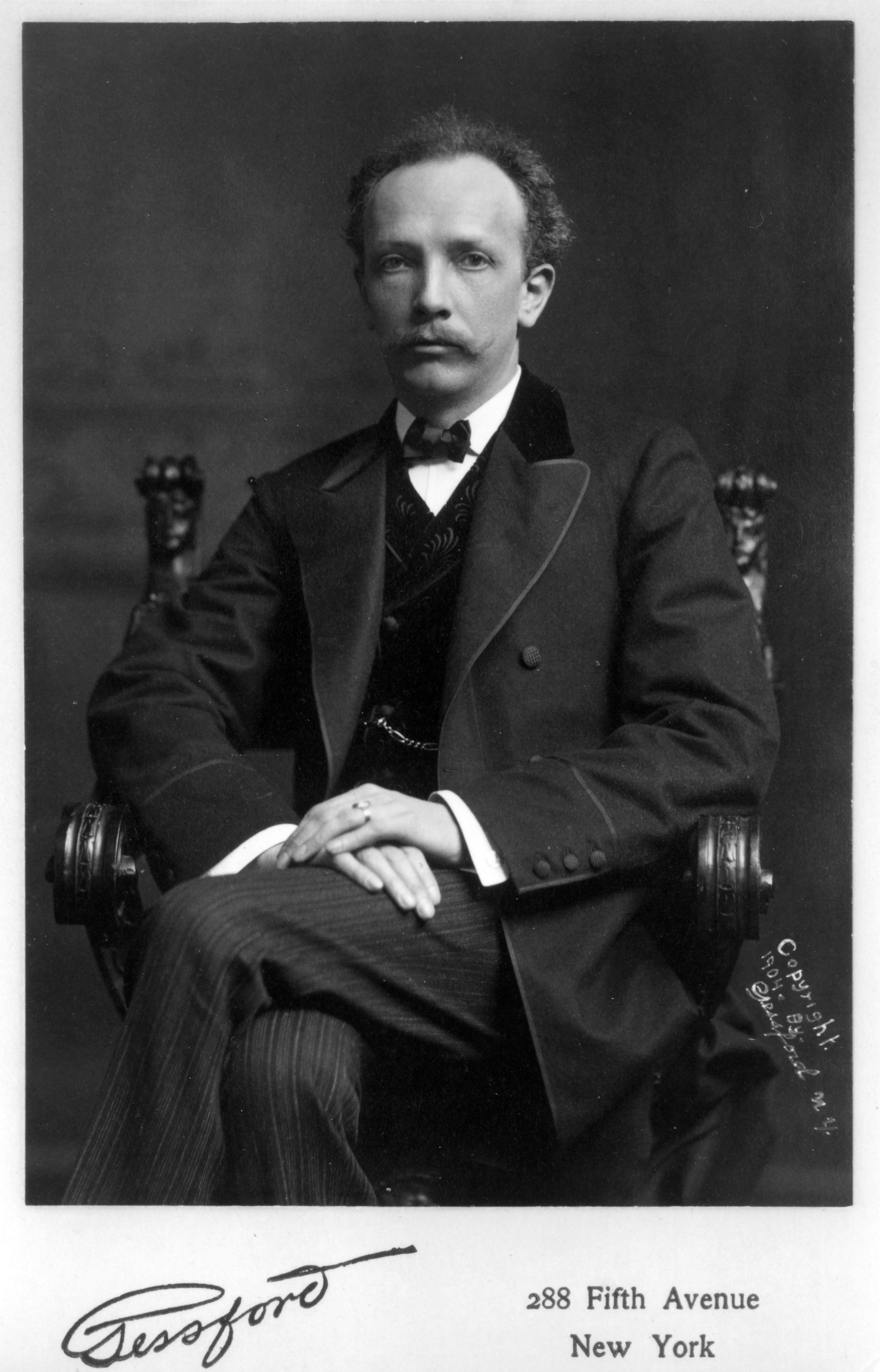

Chronologie
Produits
-
Media Type: PartitionInstrumentation: chant (h) et pianoLangue: Allemand, AnglaisNuméro du produit: HL00747062Format papierFormat papierEn stock28,99 €TTC, hors expédition
-
Compositeur: Richard StraussMedia Type: PartitionInstrumentation: mezzo/voix grave et pianoLangue: AllemandNuméro du produit: BHI 93467Format papierFormat papierÉpuisé39,00 €TTC, hors expédition
-
Compositeur: Richard StraussMedia Type: PartitionInstrumentation: voix haute et pianoLangue: AllemandNuméro du produit: BHI 93466Format papierFormat papierEn stock39,00 €TTC, hors expédition
-
Arrangement for violinCompositeur: Richard StraussArrangeur: Dejan LazićMedia Type: PartitionNuméro du produit: SIK1769Format papierFormat papierEn stock36,00 €TTC, hors expédition
-
Text: LiturgieCompositeur: Richard StraussEditeur: Klaus FischbachMedia Type: Partition électronique en PDFInstrumentation: mixed choir (SATB)Langue: LatinNuméro du produit: ED 21177 Q22990Partition PDFPartition PDFEn stock1,99 €TTC
-
de: Also sprach Zarathustra, Introduction op. 30Arrangeur: Hans-Günter HeumannCompositeur: Richard StraussMedia Type: Partition électronique en PDFInstrumentation: pianoNuméro du produit: ED 23853 Q779497Partition PDFPartition PDFEn stock1,99 €TTC
-
für Sopran, Horn in Es und KlavierCompositeur: Richard StraussEdition: Partition et partiesSéries: Edition Schott
Alphorn
Numéro du produit: ED 8389Type de produitEn stockPrix à partir de 12,99 €TTC -
based on a poem by Justinus KernerCompositeur: Richard StraussArrangeur: Thomas HennigMedia Type: Matériel en location / d'exécutionEdition: Matériel d'exécutionMatériel en location / d'exécutionMatériel en location / d'exécution
-
ThemeCompositeur: Richard StraussArrangeur: Robert SchäferEdition: Edition séparéeInstrumentation: pianoNuméro du produit: ED0 9993Type de produitEn stockPrix à partir de 3,99 €TTC
-
Poème symphoniqueCompositeur: Richard StraussEdition: Partition d'étudeInstrumentation: orchestreNuméro du produit: ETP 444Type de produitEn stockPrix à partir de 14,99 €TTC
-
2001 - A Space OdysseyCompositeur: Richard StraussArrangeur: Hans-Günter HeumannMedia Type: Partition électronique en PDFInstrumentation: pianoNuméro du produit: ED 23567 Q559950Partition PDFPartition PDFEn stock2,99 €TTC
-
Compositeur: Richard StraussEditeur: Stephan KohlerEdition: Partition d'étudeInstrumentation: orchestreNuméro du produit: ETP 8046Type de produitEn stockPrix à partir de 24,99 €TTC
-
Compositeur: Richard StraussMedia Type: Partition électronique en PDFInstrumentation: pianoNuméro du produit: ED 21827 Q21796Partition PDFPartition PDFEn stock3,99 €TTC
-
Compositeur: Richard StraussMedia Type: PartitionInstrumentation: cor et pianoNuméro du produit: BH 2600028Format papierFormat papierEn stock17,00 €TTC, hors expédition
-
"Er ist der Richtige"Compositeur: Richard StraussMedia Type: PartitionInstrumentation: 2 sopranos et pianoNuméro du produit: BH 12078Format papierFormat papierEn stock6,99 €TTC, hors expédition
-
Lyric comedy in three actsCompositeur: Richard StraussMedia Type: PartitionEdition: Réduction pour pianoLangue: AllemandNuméro du produit: BH 8000850Format papierFormat papierEn stock47,00 €TTC, hors expédition
-
Lyric comedy in three actsCompositeur: Richard StraussMedia Type: LivreEdition: LivretLangue: AnglaisNuméro du produit: BH 2533LivreLivreEn stock10,99 €TTC, hors expédition
-
Lyric comedy in three actsCompositeur: Richard StraussMedia Type: PartitionEdition: Partition d'étudeNuméro du produit: BH 2531Format papierFormat papierEn stock64,50 €TTC, hors expédition
-
Lyrische Komödie in drei Aufzügen von Hugo von HofmannsthalCompositeur: Richard StraussMedia Type: Matériel en location / d'exécutionEdition: Matériel d'exécutionLangue: Allemand, ItalienMatériel en location / d'exécutionMatériel en location / d'exécution
-
Lyrische Komödie in drei Aufzügen von Hugo von HofmannsthalCompositeur: Richard StraussMedia Type: LivreEdition: LivretSérie: Arabella
Langue: ItalienNuméro du produit: RSV 8267LivreLivreEn stock5,95 €TTC, hors expédition -
"Das war sehr gut, Mandryka"Compositeur: Richard StraussMedia Type: PartitionSérie: Arabella
Langue: AllemandNuméro du produit: RSV 8258Format papierFormat papierEn stock3,95 €TTC, hors expédition -
"Sie woll'n mich heiraten, sagt mein Vater"Compositeur: Richard StraussMedia Type: PartitionSérie: Arabella
Langue: AllemandNuméro du produit: RSV 8257Format papierFormat papierEn stock3,95 €TTC, hors expédition -
"Aber der Richtige wenn's einen gibt"Compositeur: Richard StraussMedia Type: PartitionSérie: Arabella
Langue: AllemandNuméro du produit: RSV 8256Format papierFormat papierEn stock3,95 €TTC, hors expédition -
Lyrische Komödie in drei Aufzügen von Hugo von HofmannsthalCompositeur: Richard StraussMedia Type: LivreEdition: LivretSérie: Arabella
Langue: AllemandNuméro du produit: RSV 8255LivreLivreEn stock5,95 €TTC, hors expédition -
Lyrische Komödie in drei Aufzügen von Hugo von HofmannsthalCompositeur: Richard StraussMedia Type: PartitionEdition: Réduction pour pianoSérie: Arabella
Langue: AllemandNuméro du produit: RSV 8253Format papierFormat papierEn stock44,95 €TTC, hors expédition -
Lyrische Komödie in drei Aufzügen von Hugo von HofmannsthalCompositeur: Richard StraussMedia Type: PartitionEdition: Partition d'étudeSérie: Arabella
Langue: AllemandNuméro du produit: RSV 8250Format papierFormat papierEn stock59,95 €TTC, hors expédition -
"Sie woll'n mich heiraten"Compositeur: Richard StraussMedia Type: Matériel en location / d'exécutionEdition: Matériel d'exécutionLangue: AllemandMatériel en location / d'exécutionMatériel en location / d'exécution
-
"Das war sehr gut, Mandryka"Compositeur: Richard StraussMedia Type: Matériel en location / d'exécutionEdition: Matériel d'exécutionLangue: AllemandMatériel en location / d'exécutionMatériel en location / d'exécution
-
"Und du wirst mein Gebieter sein"Compositeur: Richard StraussMedia Type: Matériel en location / d'exécutionEdition: Matériel d'exécutionLangue: AllemandMatériel en location / d'exécutionMatériel en location / d'exécution
-
"Aber der Richtige wenn's einen gibt"Compositeur: Richard StraussMedia Type: Matériel en location / d'exécutionEdition: Matériel d'exécutionLangue: AllemandMatériel en location / d'exécutionMatériel en location / d'exécution
-
Vorspiel zum 3. AufzugCompositeur: Richard StraussMedia Type: Matériel en location / d'exécutionEdition: Matériel d'exécutionMatériel en location / d'exécutionMatériel en location / d'exécution
-
(Neue Bearbeitung 1916)Compositeur: Richard StraussEdition: Réduction pour pianoSérie: Ariadne auf Naxos
Numéro du produit: AF 7453Type de produitEn stockPrix à partir de 36,99 €TTC -
"Großmächtige Prinzessin"Compositeur: Richard StraussArrangeur: Otto SingerSérie: Ariadne auf Naxos
Instrumentation: voix soprano haute et pianoNuméro du produit: AF 6335Type de produitEn stockPrix à partir de 8,99 €TTC -
Harmony music by Nigel Shore (2020)Compositeur: Richard StraussArrangeur: Nigel ShoreMedia Type: Matériel en location / d'exécutionEdition: Matériel d'exécutionMatériel en location / d'exécutionMatériel en location / d'exécution
-
(Neue Bearbeitung 1916)Compositeur: Richard StraussMedia Type: PartitionEdition: Réduction pour pianoLangue: AllemandNuméro du produit: BH 13491Format papierFormat papierEn stock49,50 €TTC, hors expédition
-
Opera in one act with a prologueCompositeur: Richard StraussMedia Type: PartitionEdition: Partition d'étude, boundNuméro du produit: BH 11693Format papierFormat papierEn stock46,00 €TTC, hors expédition
-
Opera in one act with a prologueCompositeur: Richard StraussMedia Type: LivreEdition: LivretLangue: AllemandNuméro du produit: BH 2538LivreLivreEn stock10,99 €TTC, hors expédition
-
Opera in one act with a prologueCompositeur: Richard StraussMedia Type: LivreEdition: LivretLangue: Allemand, AnglaisNuméro du produit: BH 2537LivreLivreEn stock16,95 €TTC, hors expédition
-
Opera in one act with a prologueCompositeur: Richard StraussMedia Type: PartitionEdition: Réduction pour pianoLangue: AllemandNuméro du produit: BH 2536Format papierFormat papierEn stock52,50 €TTC, hors expédition
-
(Neue Bearbeitung 1916)Compositeur: Richard StraussMedia Type: Matériel en location / d'exécutionEdition: Matériel d'exécutionLangue: AllemandMatériel en location / d'exécutionMatériel en location / d'exécution
-
(Erstfassung 1912)Compositeur: Richard StraussMedia Type: Matériel en location / d'exécutionEdition: Matériel d'exécutionLangue: AllemandMatériel en location / d'exécutionMatériel en location / d'exécution
-
"Großmächtige Prinzessin"Compositeur: Richard StraussMedia Type: PartitionSérie: Ariadne auf Naxos
Numéro du produit: AF 7458Format papierFormat papierEn stock9,00 €TTC, hors expédition -
(Neue Bearbeitung 1916)Compositeur: Richard StraussMedia Type: LivreEdition: LivretSérie: Ariadne auf Naxos
Numéro du produit: AF 7454LivreLivreEn stock10,00 €TTC, hors expédition -
(Neue Bearbeitung 1916)Compositeur: Richard StraussMedia Type: PartitionEdition: Partition d'étudeSérie: Ariadne auf Naxos
Numéro du produit: AF 7450-10Format papierFormat papierEn stock46,00 €TTC, hors expédition -
„Es gibt ein Reich, wo alles rein ist“Compositeur: Richard StraussMedia Type: PartitionSérie: Ariadne auf Naxos
Langue: AllemandNuméro du produit: AF 6333Format papierFormat papierEn stock7,00 €TTC, hors expédition -
Ouvertüre und TanzszeneCompositeur: Richard StraussMedia Type: Matériel en location / d'exécutionEdition: Matériel d'exécutionMatériel en location / d'exécutionMatériel en location / d'exécution
-
"Großmächtige Prinzessin"Compositeur: Richard StraussMedia Type: Matériel en location / d'exécutionEdition: Matériel d'exécutionLangue: AllemandMatériel en location / d'exécutionMatériel en location / d'exécution
-
„Es gibt ein Reich, wo alles rein ist“Compositeur: Richard StraussMedia Type: Matériel en location / d'exécutionEdition: Matériel d'exécutionLangue: AllemandMatériel en location / d'exécutionMatériel en location / d'exécution
-
Zerbinetta's RecitativeCompositeur: Richard StraussMedia Type: PartitionInstrumentation: soprano et pianoLangue: Allemand, AnglaisNuméro du produit: BH 83534Format papierFormat papierEn stock24,50 €TTC, hors expédition
-
for Voice and PianoCompositeur: Richard StraussEditeur: Christian WolfNuméro du produit: ED 20666Type de produitEn stockPrix à partir de 8,99 €TTC







